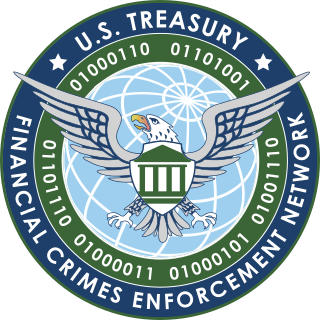Homeland security is an American national security term for "the national effort to ensure a homeland that is safe, secure, and resilient against terrorism and other hazards where American interests, aspirations, and ways of life can thrive" to the "national effort to prevent terrorist attacks within the United States, reduce the vulnerability of the U.S. to terrorism, and minimize the damage from attacks that do occur." According to an official work published by the Congressional Research Service in 2013, the "Homeland security" term's definition has varied over time.

The United States Department of Homeland Security (DHS) is the U.S. federal executive department responsible for public security, roughly comparable to the interior or home ministries of other countries. Its stated missions involve anti-terrorism, border security, immigration and customs, cyber security, and disaster prevention and management.

The Financial Crimes Enforcement Network (FinCEN) is a bureau of the United States Department of the Treasury that collects and analyzes information about financial transactions in order to combat domestic and international money laundering, terrorist financing, and other financial crimes.

The Bank Secrecy Act of 1970 (BSA), also known as the Currency and Foreign Transactions Reporting Act, is a U.S. law requiring financial institutions in the United States to assist U.S. government agencies in detecting and preventing money laundering. Specifically, the act requires financial institutions to keep records of cash purchases of negotiable instruments, file reports if the daily aggregate exceeds $10,000, and report suspicious activity that may signify money laundering, tax evasion, or other criminal activities.
In the United States, the Joint Terrorism Task Forces (JTTF) are locally-based multi-agency partnerships between various federal, state, and local law enforcement agencies tasked with investigating terrorism and terrorism-related crimes, led by the Federal Bureau of Investigation and U.S. Department of Justice. Although JTTFs were established before the September 11, 2001 attacks, their numbers dramatically increased after the attacks.
In financial regulation, a Suspicious Activity Report (SAR) or Suspicious Transaction Report (STR) is a report made by a financial institution about suspicious or potentially suspicious activity. The criteria to decide when a report must be made varies from country to country, but generally is any financial transaction that does not make sense to the financial institution; is unusual for that particular client; or appears to be done only for the purpose of hiding or obfuscating another, separate transaction. The report is filed with that country's financial crime enforcement agency, which is typically a specialist agency designed to collect and analyse transactions and then report these to relevant law enforcement. Front line staff in the financial institution have the responsibility to identify transactions that may be suspicious and these are reported to a designated person that is responsible for reporting the suspicious transaction. This means that the front line staff can ask questions and, in some cases, even decline suspicious transactions. The financial institution is not allowed to inform the client or parties involved in the transaction that a SAR has been lodged, otherwise known as tipping off under the Financial Action Task Force's Recommendations.

The Federal Protective Service (FPS) is the uniformed security police division of the United States Department of Homeland Security (DHS). FPS is "the federal agency charged with protecting and delivering integrated law enforcement and security services to facilities owned or leased by the General Services Administration (GSA)"—over 9,000 buildings—and their occupants.

The Homeland Security Act (HSA) of 2002, was introduced in the aftermath of the September 11 attacks and subsequent mailings of anthrax spores. The HSA was cosponsored by 118 members of Congress. The act passed the U.S. Senate by a vote of 90–9, with one Senator not voting. It was signed into law by President George W. Bush in November 2002.
The Memorial Institute for the Prevention of Terrorism (MIPT) is a non-profit organization founded in response to the 1995 Oklahoma City bombing. Supported by Department of Homeland Security and other government grant funds, it conducted research into the causes of terrorism and maintained the MIPT Terrorism Knowledge Base — which was an online database of terrorist incidents, groups, and other information. MIPT also worked in conjunction with RAND, for some of its research and analysis. The institute provides training and professional development dedicated to improving the skills of law enforcement officers.
Title IX: Improved Intelligence is the ninth of ten titles which comprise the USA PATRIOT Act, an anti-terrorism bill passed in the United States after the September 11, 2001 attacks. It amends the National Security Act of 1947 to require the Director of Central Intelligence (DCI) to establish requirements and priorities for foreign intelligence collected under the Foreign Intelligence Surveillance Act of 1978 and to provide assistance to the United States Attorney General to ensure that information derived from electronic surveillance or physical searches is disseminated for efficient and effective foreign intelligence purposes.
Fusion centers are designed to promote information sharing at the federal level between agencies such as the Federal Bureau of Investigation, the U.S. Department of Homeland Security, the U.S. Department of Justice, and state, local, and tribal law enforcement. As of February 2018, the U.S. Department of Homeland Security recognized 79 fusion centers. Fusion centers may also be affiliated with an Emergency Operations Center that responds in the event of a disaster.

Transnational organized crime (TOC) is organized crime coordinated across national borders, involving groups or markets of individuals working in more than one country to plan and execute illegal business ventures. In order to achieve their goals, these criminal groups use systematic violence and corruption. Common transnational organized crimes include conveying drugs, conveying arms, trafficking for sex, toxic waste disposal, materials theft and poaching.
Financial intelligence (FININT) is the gathering of information about the financial affairs of entities of interest, to understand their nature and capabilities, and predict their intentions. Generally the term applies in the context of law enforcement and related activities. One of the main purposes of financial intelligence is to identify financial transactions that may involve tax evasion, money laundering or some other criminal activity. FININT may also be involved in identifying financing of criminal and terrorist organisations. Financial intelligence can be broken down into two main areas, collection and analysis. Collection is normally done by a government agency, known as a financial intelligence organisation or Financial Intelligence Unit (FIU). The agency will collect raw transactional information and Suspicious activity reports (SAR) usually provided by banks and other entities as part of regulatory requirements. Data may be shared with other countries through intergovernmental networks. Analysis, may consist of scrutinizing a large volume of transactional data using data mining or data-matching techniques to identify persons potentially engaged in a particular activity. SARs can also be scrutinized and linked with other data to try to identify specific activity.
Intelligence-led policing (ILP) is a policing model built around the assessment and management of risk. Intelligence officers serve as guides to operations, rather than operations guiding intelligence.
The counter-terrorism page primarily deals with special police or military organizations that carry out arrest or direct combat with terrorists. This page deals with the other aspects of counter-terrorism:

The Alabama Department of Homeland Security is a state agency with the executive branch of the Alabama State government designed to develop, coordinate, and implement of a state policy to secure the State of Alabama from terrorist threat or attack. It was established by the Alabama Homeland Security Act of 2003 which was signed on June 18, 2003 by Governor Bob Riley. The Director of the Alabama Department of Homeland Security is Jay Moseley.
The Nationwide Suspicious Activity Reporting (SAR) Initiative (NSI) is a program of the United States Government used to collect and share reports of suspicious activity by people in the United States. The Nationwide SAR Initiative (NSI) builds on what law enforcement and other agencies have been doing for years — gathering information regarding behaviors and incidents associated with criminal activity — but without the customary restrictions on collecting data on individuals in the absence of reasonable suspicion or probable cause. The program has established a standardized process whereby SARs can be shared among agencies to help detect and prevent terrorism-related criminal activity. This process is in direct response to the mandate to establish a "unified process for reporting, tracking, and accessing [SARs]" in a manner that rigorously protects the privacy and civil liberties of Americans, as called for in the 2007 National Strategy for Information Sharing (NSIS), which in turn was authorized by the Intelligence Reform and Terrorism Prevention Act of 2004. Reports of suspicious behavior noticed by local law enforcement or by private citizens are forwarded to state and major urban area fusion centers as well as DHS and the FBI for analysis. Sometimes this information is combined with other information to evaluate the suspicious activity in greater context. The program is primarily under the direction of the US Department of Justice.
The Information Sharing Environment (ISE) was established by the United States Intelligence Reform and Terrorism Prevention Act of 2004. Under Section 1016 of IRTPA, the Program Manager for the Information Sharing Environment (PM-ISE) was granted government wide authority to plan for, oversee the implementation of, and manage the ISE.
Intelligence sharing is "the ability to exchange intelligence, information, data, or knowledge among Federal, state, local or private-sector entities as appropriate." Intelligence sharing also involves intergovernmental bilateral or multilateral agreements and through international organizations. Intelligence sharing is meant to facilitate the use of actionable intelligence to a broader range of decision-makers.

BlueLeaks, sometimes referred to by the Twitter hashtag #BlueLeaks, refers to 269.21 gibibytes of internal U.S. law enforcement data obtained by the hacker collective Anonymous and released on June 19, 2020, by the activist group Distributed Denial of Secrets, which called it the "largest published hack of American law enforcement agencies".






